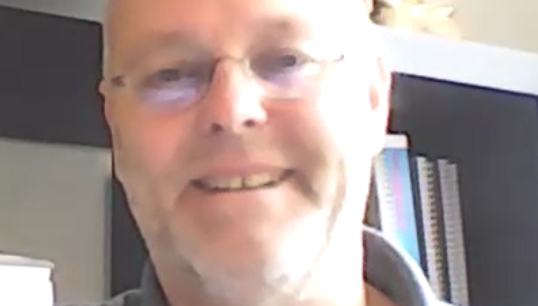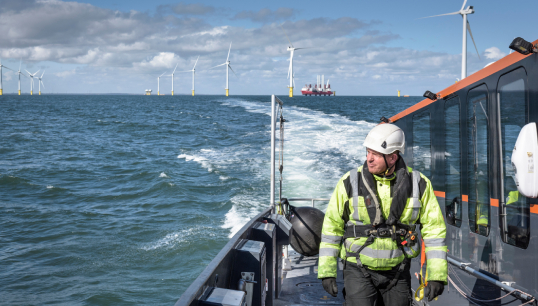- Topics
- Campaigning
- Careers
- Colleges
- Community
- Education and training
- Environment
- Equality
- Federation
- General secretary message
- Government
- Health and safety
- History
- Industrial
- International
- Law
- Members at work
- Nautilus news
- Nautilus partnerships
- Netherlands
- Open days
- Opinion
- Organising
- Podcasts from Nautilus
- Sponsored content
- Switzerland
- Technology
- Ukraine
- United Kingdom
- Welfare

With North Sea oil and gas extraction starting to dwindle, countries like the UK and Netherlands are investing heavily in offshore windfarms and exploring other renewable energy sources such as tidal power and offshore hydrogen production. It's a major growth area for maritime jobs, and Nautilus is ready and waiting to support members in the sector, as Sarah Robinson discovers
Nautilus International is the Union for all maritime professionals, so when a particular sector expands or professionalises, we make sure that workers are aware of the support we provide. It's a principle that has seen great success in the superyacht sector over recent years, where seafarers have been signing up in droves to benefit from services such as legal support in retrieving unpaid wages.
The latest emerging sector is offshore renewables, where Union membership is vital for navigating a very mixed employment environment. Some established employers who already have a relationship with Nautilus are repurposing their vessels from dredging or oil and gas platform support. However, there are other newer players in offshore renewables who are providing insecure work or have a questionable safety record.
Nautilus has already won a victory for UK members in offshore renewables by successfully campaigning for an end to the Offshore Wind Workers Concession, a visa loophole that allowed employers operating in UK waters to employ workers from other countries at lower rates than British seafarers would command.
To find out more about what's happening in the sector and how Nautilus is responding to members' needs, I interviewed my colleagues Martyn Gray, our director of organising based in the UK branch, and Michel Steketee, senior national secretary in the Netherlands branch


What kinds of jobs are there for Nautilus members in the offshore renewables sector?
Martyn Gray: It's an exciting and diverse area that has been growing for the last 30 to 40 years. And indeed, by 2030, we're going to need thousands more seafarers and hundreds more ships in order to really drive forward sustainability for our net zero ambitions.
There's a really wide variety of different work that exists in offshore renewables. It's not just about wind turbines, with platform applications, it's floating offshore wind. And it's other projects that are potentially in the pipeline, such as tidal barriers and other mechanisms, which will require ships and seafarers to help in their construction.
Michel Steketee: Even just for wind turbines, there's a variety of jobs dependent on the stages of development of the wind farms – it could be the construction period, or the operating and maintenance period or the decommissioning period.
What kind of vessels would people be working on?
MG: For the construction and placement of wind turbines offshore, these are typically larger vessels with specialised lift equipment and, in some instances, ballasting and control equipment, to make sure that they remain in position and can lift all of the equipment that's needed.
There will also be smaller vessels that are less specialised and perhaps have either been used in another life in the offshore sector as guard vessels, or in fishing or leisure. We're finding more and more of these are being utilised for crew transfer.
MS: Here in the Netherlands, we are seeing the 'Big Four' companies in the dredging sector repurposing their existing vessels to work in offshore wind – and this is also happening with companies operating in oil and gas platform support.

So what skills and qualifications do seafarers need in order to work on these different types of vessels?
MS: For captains, first mates and some engineers, the work isn't that different, but you might want to do a new job like operating a crane. We had some members working in the dredging sector before offshore wind, and they needed extra training to become crane operators or gain dynamic positioning skills.
MG: Your STCW qualifications remain essential to be qualified and capable to work on larger ships. For the smaller vessels, we're seeing increasing numbers of former fisheries people – we're seeing instances of those operating on boatmasters' licences, who are able to come in operate on commercial endorsements.
There's such a variety of tasks that are needed to support offshore renewables and in particular offshore wind, that there is something for everyone at every different level of qualification.
Looking at what you'll be handling, you've got large tower sections for the turbines that need to be transported and craned into position. With regards to floating offshore wind, you've got anchor points and you've got cabling.
It sounds like we're going to see a lot more seafarers working in offshore renewables. Why should they join Nautilus – and what are we doing to recruit them as Union members?
MG: Nautilus membership is essential for a maritime professional, whether at sea or ashore. If you are working in maritime or maritime related industry, you need to be protected by a trade union that understands the industry and has been working to make it better for over 150 years.
We offer a wide legal network that allows members to get that support that they need when things go wrong, wherever they are in the world. We are there to help develop and support the skills of the future and to make sure that the cost of upskilling sits with those who are going to take the greatest benefit from it.
We lobby governments and work with international regulatory bodies to make sure the training and safety standards are in place for our members to carry out their work competently and safely. And of course we negotiate better pay and conditions for seafarers through collective bargaining agreements. If you work in maritime, it just makes sense to be a member.
MS: What is important is that we reach out to employees and to get in touch with them, to talk with them about membership. And there's several ways to do that. First of all, we can ask our existing members to get in contact with their colleagues. We've got, for example, our Telegraph, including the Netherlands edition, and there's a QR code at the back which our members can show to their colleagues. But we also do fleet visits where we talk directly to employees and encourage them to join.

What kind of support are we providing specifically to members in offshore renewables?
MG: We're widely engaged with companies that are present and emerging in the sector. We're trying to develop further in terms of salary levels and improvements in safety protections.
MS: In the Netherlands, we are looking to negotiate new collective bargaining agreements, or CBAs, in the sector. We were hoping to negotiate a national sector-wide CBA for offshore wind, but the employers weren't ready – they didn't have their own employer association – so we changed our strategy a little bit from gaining national CBAs to gaining CBAs with individual companies. In some companies where we have already got agreements, we want to broaden those agreements to include offshore wind personnel.
MG: As we see a slow but expected decline in the number of vessels used in hydrocarbon extraction, many of these vessels will be suitable to transition across to offshore renewables. When this happens, it's important that seafarers are supported with the skills and the training that they may need to facilitate that. So we're engaging with our members in offshore renewables to make sure we understand their needs and concerns so we can start dealing with some of the emerging challenges before they become too ingrained.
• To join Nautilus International as a UK-based member, go to our English-language joining page. In the Netherlands, go to our Dutch-language joining page
Tags
